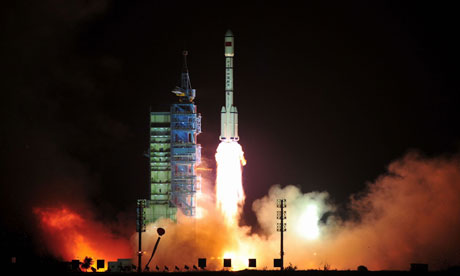China space station signals shift in space race
Prominent figures in US space community such as Neil Armstrong worry that NASA is being left behind on the launchpad
by Richard Luscombe in Miami, guardian.co.uk, 30 September 2011

After edging out the Soviets and winning the race to land a human on the moon in 1969, the United States has enjoyed more than four decades unchallenged as the world's dominant force in space. The launch on Thursday of the first stage of a new Chinese space station could be seen as the beginnings of a shift in that power.
That China has joined the US and Russia as the third nation with the capability of a permanent crewed presence in space is not, in itself, a significant challenge to American supremacy. NASA launched its first habitable research laboratory, Skylab, in 1973, and even if China's Tiangong-1 remains safely in orbit after its arrival, it is still likely to be at least another year before its astronauts are able to make any kind of extended-duration stay.
The wider concern of those who follow the US space programme is the converse trajectories the two nations appear to be taking in support of their ambitions in space.
China, which has invested millions of dollars in recent years into a burgeoning space programme, now has a flagship piece of hardware already off the launchpad. NASA currently has no manned launch capability of its own for crewed vehicles following the retirement of the space shuttle fleet this summer.
It is a situation that rankles with prominent figures in the US space community, among them Neil Armstrong, the first man on the moon, who last week lambasted the American programme as an embarrassment that could soon be eclipsed by the achievements of other nations.
"For a country that did so much for so long to achieve a leadership position in space exploration and exploitation, this is viewed by many as lamentably embarrassing and unacceptable," he told a congressional hearing on the future of space flight. "NASA leaders enthusiastically assured the American people that the agency was embarking on a new age of discovery. But the termination of the shuttle, the cancellation of existing rocket and spacecraft programmes, the lay-off of thousands of aerospace workers [and] the outlook for American space activity through the next decade is difficult to reconcile with agency assertions."
NASA did, earlier this month, announce its vision of a future spacecraft, the Space Launch System, which will be the most powerful rocket ever built and is designed to carry astronauts farther into space than ever before. Its cost, estimated in leaked NASA calculations at more than $62bn over the next 15 years, could yet prove a barrier and the first unmanned test flights are not scheduled until 2017.
In the shorter term, NASA is contracting out work that was previously its lifeblood. Cargo, and eventually crew, transportation to the international space station is being tendered to commercial enterprises such as SpaceX and Blue Origin, established respectively by internet entrepreneurs Elon Musk and Jeff Bezos.
SpaceX plans its first cargo transfer launch in November. Until commercial spacecraft are deemed safe enough, US astronauts must hitch rides aboard Russia's Soviet-era Soyuz spacecraft, at a cost of up to $63m per seat.
But the Russian programme is embroiled in its own turmoil after an unmanned Soyuz failed on its way to the international space station last month, and the next manned mission was delayed until November. China's progress, and uncertainty elsewhere, have led to renewed calls for greater partnership between the world's space-faring nations, although US co-operation with the Chinese is specifically prohibited by an act of Congress.
"China has the technology but doesn't have the spaceflight experience that we do," said Leroy Chiao, a former ISS commander and shuttle astronaut, and advocate for closer ties. "Co-operation is the way forward. You can argue that NASA and Russia did all this before but China started its programme in 2003 and in eight years has demonstrated more ambitious flights. It has a modern vehicle with sophisticated technology, so this isn't just a copy of Skylab. It leaves China on the verge of a major step forward."
|
|
|
|
|
|
|
|
|
|
|
|
|
|
|
|
 选择“Disable on www.wenxuecity.com”
选择“Disable on www.wenxuecity.com”
 选择“don't run on pages on this domain”
选择“don't run on pages on this domain”

